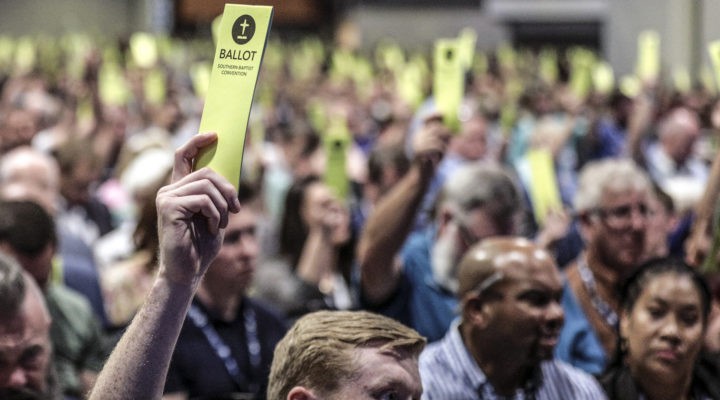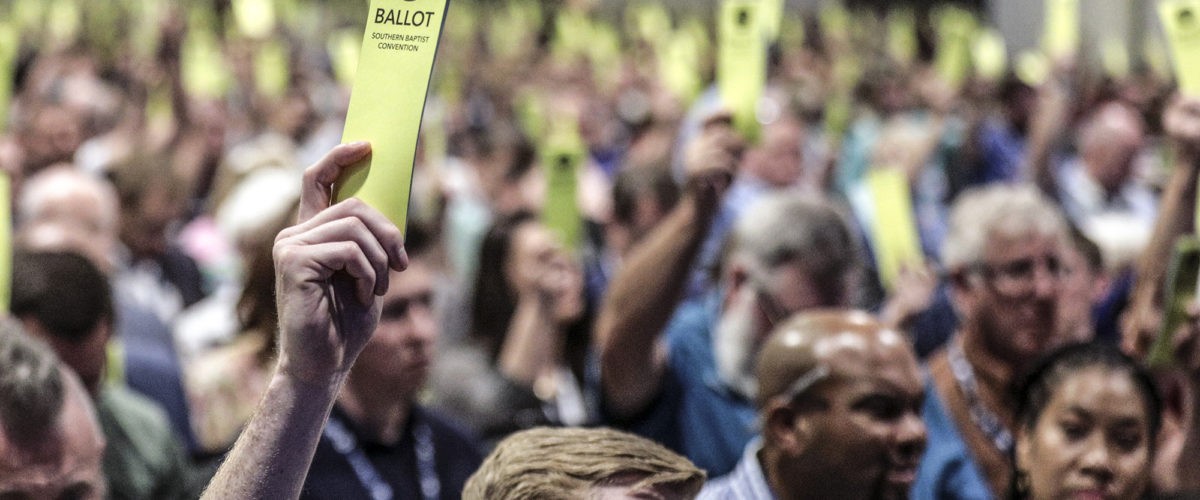Proposals to change the name of the Southern Baptist Convention to Great Commission Baptists get a thumbs-up from the SBC’s Executive Committee but a formal name change will not be recommended to SBC messengers gathered in Anaheim, Calif., for the June 14-15 annual meeting.
That is among several newsworthy items appearing in the SBC’s 2022 Book of Reports, recently released in advance of the annual meeting. The 224-page digital book includes reports and statistics from all SBC agencies and institutions, as well as responses to motions referred to various entities from last year’s convention.
Another topic of particular interest, which was referred to all SBC entities, concerns the use of non-disclosure agreements. Only three of the SBC’s dozen entities appear to have answered a direct question about how many NDAs they have used in the past five years — a report unlikely to satisfy those internal critics who believe terminated employees are being silenced.
Only three of the SBC’s dozen entities appear to have answered a direct question about how many NDAs they have used in the past five years.
Resolutions Committee concerns
Also, in response to three separate motions about the SBC Resolutions Committee, the Executive Committee reports that the chair of its Committee on Convention Missions and Ministry will appoint “an ad hoc committee composed of previous Resolutions Committee members and others deemed familiar with the process to study the matter and report back any recommendations to the Committee on Convention Missions and Ministry during their Sept.19-20, 2022, meeting for consideration, and that the SBC Executive Committee will report its final actions to the 2023 Southern Baptist Convention annual meeting.”
For decades, the adoption of non-binding resolutions by convention messengers has been controversial, and recently individuals who have proposed specific resolutions have been upset that the Resolutions Committee did not put forward their exact wording for an up-or-down vote. Last year, messengers offered motions to amend the process used by the Resolutions Committee and to kill off the committee entirely.
International missionaries as convention messengers
Another motion referred to the Executive Committee from last year’s convention asked that “international missionaries” be allowed “to vote by proxy at SBC meetings.” Currently, the SBC’s bylaws require that registered messengers be physically present in the meeting hall to vote and no one may register as a messenger without being on site.
The Executive Committee reports back that “after significant review it declines to recommend the opportunity for remote participation in the annual meeting” and lists seven reasons. Chief among those is the technological limitations that still exist.
Great Commission Baptists
Regarding the potential name change, last year messenger Philip Nelson of Illinois moved: “Due to the long history of unbiblical racial practices of many of our churches in our history, we repent of such sins by confession and encourage the adoption of the name of Great Commission Baptist Churches. I move that from this day on we refer to our Convention of churches as The Great Commission Baptists.”
Also, messenger Christopher Benavides of Texas moved: “In the continued spirit of unity and in light of the increasing ethnic and geographical diversity of churches in the SBC and proliferation of churches in the SBC network around the world, I would like to make a motion to amend Article I of the Constitution to rename the Southern Baptist Convention to the Great Commission Baptists.”
“The SBC Executive Committee declines to consider changing the legal name of the Southern Baptist Convention, it will continue to utilize the descriptor ‘Great Commission Baptists’ in its communications and publications.”
In response to both motions, the Executive Committee offered an affirmation but not a formal name change: “The SBC Executive Committee reports that it enthusiastically affirms the 2012 action of the Southern Baptist Convention which provided for churches, entities, and organizations in friendly cooperation with the convention to utilize the descriptor ‘Great Commission Baptists’ to indicate their relationship and cooperation with the Southern Baptist Convention, viewing the descriptor ‘Great Commission Baptists’ fully in keeping with our Southern Baptist Convention identity, and although the SBC Executive Committee declines to consider changing the legal name of the Southern Baptist Convention, it will continue to utilize the descriptor ‘Great Commission Baptists’ in its communications and publications.
Non-disclosure agreements
Amid the contentious political climate of the SBC, concerns have mounted in recent years about a perceived proliferation of non-disclosure agreements by SBC entities — particularly when used as part of involuntary separation agreements for employees.
Because of the very nature of NDAs, most of the concern has appeared speculative. But the concern has been nonetheless real, and it comes from all sides within the SBC political world. Critics have particularly asked questions of the SBC’s North American Mission Board and a few of the denomination’s six seminaries — all of whom are suspected by critics of buying the silence of fired employees.
Thus messenger Brad Patterson of Texas last year made this motion: “That the Southern Baptist Convention request each entity to examine its use of non-disclosure agreements and report its findings to the messengers of the 2022 annual meeting of the Southern Baptist Convention in Anaheim, Calif., reporting said findings with particular attention to three areas: what is biblical justification for the use of non-disclosure agreements; how many non-disclosure agreements have been signed or agreed to in the last five years; and if non-disclosure agreements have been utilized, for what specific purposes were they utilized?”
By policy, each entity is required to respond to the messenger’s questions because the motion was formally referred to them for a response. The Book of Reports is the venue for their responses.
Only three entities — Gateway Seminary in California, New Orleans Seminary in Louisiana, and GuideStone Financial Resources — give a direct answer to the “how many” question. Both seminaries report zero use of NDAs in the past five years, and Guidestone reports 114 “exclusively in connection with agreements with vendors, suppliers or the ministry organizations GuideStone serves.”
The Executive Committee gives a qualified answer by redefining the terms: “While non-disclosure agreements or confidentiality clauses are used in both for-profit and nonprofit businesses as a standard practice and are considered a best practice of fulfilling one’s fiduciary obligation and stewardship to an organization, the SBC Executive Committee has never entered into an agreement for the sole purpose of creating a non-disclosure arrangement but has occasionally included confidentiality clauses or non-disclosure clauses in agreements as needed and within the scope and direction of its trustees who are duly elected by the messengers of the Southern Baptist Convention.”
Other entities generally follow the theme of explaining that such decisions fall under the purview of their duly elected trustees.
The longest response comes from NAMB, which begins by noting its “contracting policies and procedures are administered with accountability to the NAMB board of trustees. The board believes our policies help NAMB steward with prudence and wisdom the resources entrusted to us, and they make it possible to work with ministry partners with appropriate discretion.”
Later in its response, NAMB defends NDAs “rightly understood” as “one way of acting with prudence and wisdom to protect sensitive information and shield employees, ministry partners and vendors from the potential of having confidential matters weaponized against an individual and/or the organization.”
“For decades, out of an abundance of caution and prudence, NAMB has relied on these agreements when appropriate. The NAMB board of trustees has implemented open-door and whistleblower policies designed to maintain full integrity and accountability. At NAMB, non-disclosure agreements are never used to cover up corruption, criminal acts or hide wrongdoing.”
Among other entity responses:
International Mission Board: “IMB’s use of NDAs and confidentiality provisions enables us to faithfully protect and deploy the resources entrusted to us.”
GuideStone: “GuideStone biblically justifies its use of NDAs as a necessary tool in the current economic environment to satisfy its responsibility as a good steward of the resources and obligations committed to its ministry.”
Lifeway Christian Resources: “Lifeway utilizes common confidentiality agreements or confidentiality provisions in commercial contracts to protect confidential and proprietary information, allow parties to conduct the proper due diligence and share information, and to comply with local and federal privacy laws and regulations related to data protection and personal private information.”
Ethics and Religious Liberty Commission: The ERLC “occasionally enters into agreements with these clauses for certain hotel contracts and other similar business arrangements” and NDAs are “occasionally used with employment-related agreements for the purpose of protecting the privacy of those involved as matters that were between the trustees and the employees.”
Midwestern Seminary: “Midwestern Seminary may use an NDA for a host of reasons, including to protect institutional intellectual property, as well as to both honor and safeguard a departing employee, the institution itself, and the resources Southern Baptists have entrusted to us.”
Southeastern Seminary: “SEBTS does not regularly use non-disclosure agreements except in certain cases where it is prudent business practice mainly in vendor relationships.”
Southern Seminary: “Specific contract provisions may be required by applicable law and sound employment practices, and many of these contracts include clauses requiring confidentiality and non-defamation. These contract provisions represent the institution’s exercise of stewardship and trust.”
Southwestern Seminary: “In the fulfillment of its responsibilities to various constituencies — students, faculty, staff and alumni — it has been necessary at times for the seminary to enter into agreements that contain non-disclosure provisions. These instances include, but are not limited to, contracts with third-party vendors and employment separation agreements.”
Related articles:
Candidate forum explores the views of three very conservative SBC presidential nominees


